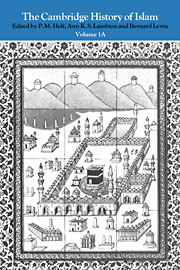Book contents
- Frontmatter
- Introduction
- Part I The rise and domination of the Arabs
- Part II The coming of the steppe peoples
- Part III The central Islamic lands in the Ottoman period
- 1 The rise of the Ottoman empire
- 2 The heyday and decline of the Ottoman empire
- 3 The later Ottoman empire in Rumelia and Anatolia
- 4 The later Ottoman empire in Egypt and the fertile crescent
- 5 Safavid Persia
- 6 Persia: the breakdown of society
- 7 Central Asia from the sixteenth century to the Russian conquests
- Appendix The Golden Horde and its successors
- 8 Tsarist Russia and the Muslims of central Asia
Appendix - The Golden Horde and its successors
from Part III - The central Islamic lands in the Ottoman period
Published online by Cambridge University Press: 28 March 2008
- Frontmatter
- Introduction
- Part I The rise and domination of the Arabs
- Part II The coming of the steppe peoples
- Part III The central Islamic lands in the Ottoman period
- 1 The rise of the Ottoman empire
- 2 The heyday and decline of the Ottoman empire
- 3 The later Ottoman empire in Rumelia and Anatolia
- 4 The later Ottoman empire in Egypt and the fertile crescent
- 5 Safavid Persia
- 6 Persia: the breakdown of society
- 7 Central Asia from the sixteenth century to the Russian conquests
- Appendix The Golden Horde and its successors
- 8 Tsarist Russia and the Muslims of central Asia
Summary
Jochi (c. 1176–1227), the eldest son of Chingiz Khān, had been granted the most westerly part of the area dominated by the Mongols as his appanage. At his death this area was divided among his sons. The eldest, Orda, took the most easterly part (including most of what is now Kazakhstān and parts of western Siberia) where his subject clans became known as the ‘White’, or, occasionally, the ‘Blue Horde’. Another son, Shiban, arabicized as Shaybān, held a fief to the north of this area, east and south-east of the Urals, around the headwaters of the Irtysh, Ishim and Tobol rivers, from which later emerged the khanate of Sibir. But in the immediate future the most important inheritance was that of the second son, Batu (d. 1255), who was given the most westerly part of Jochi's appanage, in the region of the Emba and Ural rivers. Batu thus became the logical leader of the new western campaign, which was launched in 1236, and which brought under Mongol control the steppe-land to the north of the Black Sea, established Mongol dominion over the Slavic states to the north, ravaged eastern Europe and led to the formation of the political unit known to the Russians, and so to Europe, as the Golden Horde.
Batu's campaign spread fear and horror throughout Europe. The rapidity of the movements of the Mongol troops and their strange appearance contributed to the enduring legend that they represented the imposition of a novel and alien rule.
- Type
- Chapter
- Information
- The Cambridge History of Islam , pp. 495 - 502Publisher: Cambridge University PressPrint publication year: 1977

